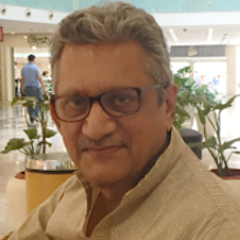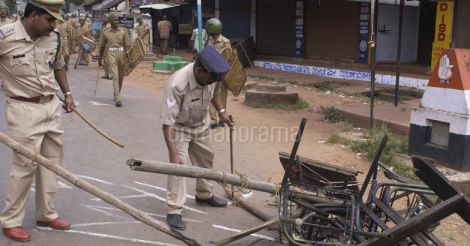Those who had hoped that political violence would abate after the elections were in for a jolt when the Payyannur murders happened. First a CPM worker was murdered allegedly by RSS workers and then this was followed by the revenge murder of an RSS worker allegedly by CPM workers. The opposition parties were quick to allege that CPM had let loose a reign of terror in Kannur as soon as Pinarayi Vijayan occupied the chief ministerial chair. When the matter was raised in the assembly, the chief minister officially stated that the second murder appeared to have been committed as revenge for the first. This was taken as an admission of guilt by CPM though it was only the police version of facts and chief minister was not speaking as a spokesman for CPM. Leaders of CPM say that RSS had been emboldened by the comparatively better performance of BJP in the recently held assembly and local bodies elections and the Payyannur murder of a CPM activist was the culmination of its newly increased aggressive tactics. Privately they also say that RSS had to be shown that violence would be met with violence. These murders are, however, unlikely to be the last in the chain of such incidents.
Governance finally gets a chance: Can Pinarayi give people priority over parties, unions?
CBI is no touchstone for crime probes, Kerala cops should do better
A few years back I happened to meet an eminent Indian American doctor at a party in Delhi hosted by a businessman friend who had been a VHP activist for many years. This good doctor had been a major contributor to the huge flow of funds to the VHP/BJP kitty from the very affluent North Indian Hindu community living in the United States. He had been told that the communal violence in India had been orchestrated by the ISI agents operating in India and taking orders from their masters on the other side of the border. He, therefore, looked surprised when it was mentioned that Islamic militancy in India was very much a homegrown phenomenon that had taken wings after the demolition of Babri Masjid and the Gujarat riots. Without going into the claims that Babri Masjid had been constructed by a Muslim invader on a Hindu holy site after demolishing an existing Hindu temple and that the Gujarat riots were a response to the Godhra killings, one has to recognize that these two events were important milestones in the evolution of Hindu-Muslim relations in India in recent times.
It is alleged that many of the criminal gangs in the border state of Gujarat were earlier led by Muslim gangsters who used to intervene on behalf of their coreligionists in Hindu-Muslim disputes and the Hindu community had wanted to put them in their place for a long time. Whatever is the truth of these allegations and counter-allegations, many of the people who were killed in the riots were peace-loving ordinary people and their only fault was that they were Muslims. It is not unusual for at least some of the people whose parents had been slaughtered or wives and sisters raped before their eyes to thirst for revenge. This is quite similar to the phenomenon that was dramatized by Thoppil Bhasi’s famous KPAC drama “Ningal Enne Communistaki”. Even peace-loving people are sometimes turned into militants by tragic circumstances. Violence begets violence.
The curious connect between Bourbon kings of France and Congress
The traditional wisdom prevailing in administrative circles is that force must be met with force and violence should be put down with strong action. Yet this can only be the guiding spirit of short-term tactics and not a long-term strategy which needs to address the basic issues leading to violence. Violent clashes between political rivals like CPM and RSS do not exactly fit into this category as the cause of violence is not any grievance that can be addressed but pure power struggle. Nevertheless the growing tendency to try to resolve disputes by use of force should be a matter of grave concern for any democratic society.
Long-term solutions to violent incidents involving groups of people will have to address three aspects of the problem. Wherever such violence is caused by a perceived sense of injustices, these have to be addressed effectively and fairly within a reasonable time limit. The slow movement of criminal justice system and its failure to ensure quick and deterrent punishment to perpetrators of violent crimes is the second aspect as this denouement can make the victims feel frustrated and angry. The absence of a focus on responsible citizenship and respect for law and for authority in our school education system is the third aspect.
The incidents of collective violence in Kerala mostly involve political parties though there have been a few incidents of communal clashes too in the recent past. These did not arise out of any real or imaginary sense of injustice or grievances though conditions conducive for Naxalite type movements do persist in some parts of the state. While the government needs to have special programs in the few remaining islands where gross injustice and socio-economic exploitation still exist to address these problems, the pan-Kerala focus has to be on the other two aspects, namely, efficacy of the criminal justice system and rectification of the school education curriculum to address the need for greater consciousness of citizenship responsibilities and respect for law.
Public confidence in the political neutrality of the crime investigation machinery has eroded significantly because of the politicization of police unions. In the ideal situation, unionization per se should not be allowed in uniformed services. Imagine a situation where the army were to allow jawans and officers to form trade unions! Police is no different. Unfortunately this may be too much to expect in Kerala where every group of people is unionized. The bare minimum that the government should be doing is to enforce the existing rule banning political activity by government servants. Indeed the police needs to get more professionalized in every respect. Separately, the government should take the initiative to speed up the justice delivery system by increasing the number of courts and taking other measures including certain judicial reforms with the cooperation of the high court.
The present education system’s focus is only on equipping the children to get jobs. This should change. Much greater importance needs to be given to inculcating the right value system including respect for law. The government should appoint a committee to revise the school curriculum to address this issue and act on the committee’s recommendations with great speed. We have already damaged two generations with the mindless pursuit of jobs and cannot afford to lose any more time in acting on this.
The chief minister has repeatedly stated that he wants to take Kerala on a new trajectory of progress and development. This lofty objective cannot be achieved unless law and order is effectively maintained and public tranquility becomes the new norm.
(The author is a former civil aviation secretary and former member, Union Public Service Commission. The views expressed are personal.)

























 Police inspect a crime scene after an episode of political violence in Kannur. File photo
Police inspect a crime scene after an episode of political violence in Kannur. File photo